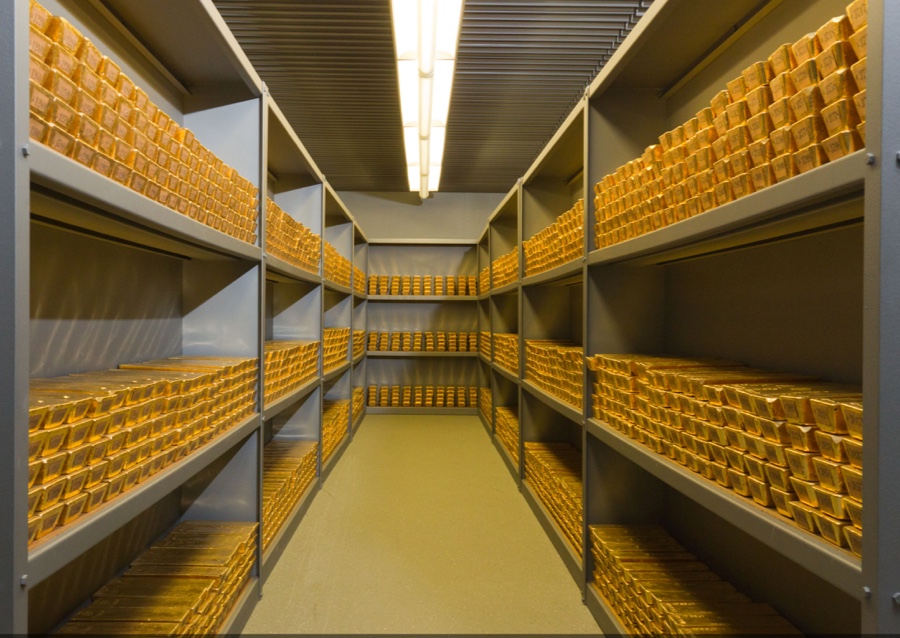Gold tops $1,500 as investors seek shelter from gathering storm

Gold futures rallied above $1,500 an ounce on sustained demand for the traditional haven as the US-China trade war festers, global growth slows and central banks around the world ease monetary policy.
The metal advanced as much as 2.6% an ounce on the Comex to the highest since 2013. The move extends this year’s climb to 18%, with gains underpinned by inflows into exchange-traded funds and central bank purchases. China’s central bank expanded its gold reserves for an eighth straight month in July.
Gold has been one of the chief beneficiaries of the turmoil in global financial markets as Washington and Beijing spar over trade. In recent days, the Trump administration threatened fresh tariffs against Chinese goods, the yuan was allowed to sink, and the US branded China a currency manipulator. The stand-off has boosted the odds of more easing from the Federal Reserve. Mounting “growth worries,” prompted Goldman Sachs Group to predict prices will climb to $1,600 an ounce over the next six months.
The latest ructions have sent investors rushing to havens, pushing the world’s stockpile of negative-yielding bonds to a record
“Gold is serving its traditional role as a safe-haven asset,” said Wayne Gordon, executive director for commodities and foreign exchange at UBS Group AG’s wealth management unit. Under the bank’s risk case, marked by a further escalation of the trade fight, prices could go as high as $1,600, he said.
Futures for December delivery traded at $1,513.80 an ounce at 10:15 a.m. in New York, gaining for a fourth day. Silver also surged, with futures climbing above $17 for the first time since June 2018.
Miners also benefited from the rally with AngloGold Ashanti rising as much as 7.8% to its highest price in more than seven years. Barrick Gold Corp., Newmont Goldcorp Corp. and Newcrest Mining Ltd. also soared.
Lower rates
Last month, the Fed reduced borrowing costs for the first time in more than a decade, responding in part to the impact of the trade war. Lower rates boost the appeal of non-interest-bearing bullion.
On Wednesday, New Zealand’s Reserve Bank shocked markets with a half-percentage point interest-rate reduction, while India’s central bank also delivered a bigger-than-expected move. Those cuts were followed by the Bank of Thailand unexpectedly lowering its benchmark interest rate for the first time in more than four years.
The latest ructions have sent investors rushing to havens, pushing the world’s stockpile of negative-yielding bonds to a record, with the market value of the Bloomberg Barclays Global Negative Yielding Debt Index closing at $15.01 trillion Monday. The yield on 10-year Treasuries has tumbled.
Bullion has plenty of fans among veteran investors. Mark Mobius said in July prices were poised to top $1,500 as interest rates headed lower, declaring: “I love gold.” Billionaire hedge-fund manager Ray Dalio has suggested the market may just be at the start of a period that would be very positive for gold.
In addition to the challenges thrown up by the trade war, there are other risks. In Europe, investors are tracking the chances of a no-deal Brexit later this year, while there are tensions in the Middle East between Iran and the US.
Further support for the rally has come from central-bank buying, with authorities in China, Russia, Poland and Kazakhstan all boosting holdings. That trend shows no sign of slowing, with the People’s Bank of China adding almost 10 tons to reserves in July.
“We see the ongoing steep rise in the gold price as an expression of the high risk aversion among market participants,” said Daniel Briesemann, an analyst at Commerzbank AG. “Gold is quite clearly still in demand as a safe haven in the current market environment, as reflected, among other things, in continuing ETF inflows.”
(By Ranjeetha Pakiam, Rupert Rowling and Justina Vasquez, with assistance from Krystal Chia)
{{ commodity.name }}
{{ post.title }}
{{ post.date }}




Comments